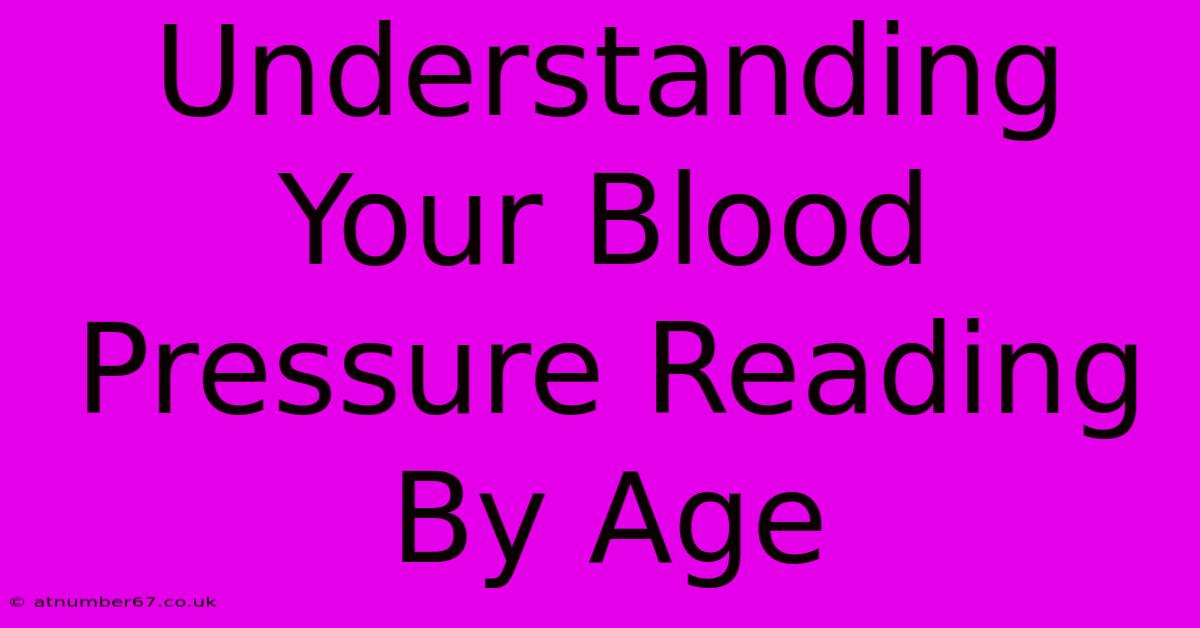Understanding Your Blood Pressure Reading By Age

Table of Contents
Understanding Your Blood Pressure Reading By Age
Understanding your blood pressure is crucial for maintaining good health, and knowing what's considered normal changes as you age. This guide will help you decipher your blood pressure readings and understand what they mean at different life stages. We'll explore normal ranges, potential risks, and when to seek medical advice.
What is Blood Pressure?
Blood pressure measures the force of your blood against your artery walls. It's expressed as two numbers: systolic and diastolic.
- Systolic pressure: The top number, representing the pressure when your heart beats.
- Diastolic pressure: The bottom number, representing the pressure when your heart rests between beats.
Both numbers are important indicators of your cardiovascular health.
Normal Blood Pressure Ranges by Age
While there's no single "perfect" blood pressure, these ranges generally apply. It's crucial to consult your doctor for personalized advice. They'll consider your individual health history, family history, and lifestyle factors.
Childhood and Adolescence (Generally Under 18)
Normal blood pressure varies considerably depending on age, sex, and height. Regular check-ups are important to monitor growth and identify potential issues early. Your pediatrician will provide age-appropriate guidelines and interpret the readings. Elevated blood pressure in children requires prompt attention.
Adulthood (18-64)
- Normal: Less than 120/80 mmHg
- Elevated: Systolic between 120-129 mmHg and diastolic less than 80 mmHg. This stage often requires lifestyle changes.
- High Blood Pressure (Hypertension) Stage 1: Systolic between 130-139 mmHg or diastolic between 80-89 mmHg. Medical intervention may be necessary.
- High Blood Pressure (Hypertension) Stage 2: Systolic 140 mmHg or higher or diastolic 90 mmHg or higher. Requires prompt medical attention and medication.
- Hypertensive Crisis: Systolic over 180 mmHg and/or diastolic over 120 mmHg. This is a medical emergency requiring immediate care.
Older Adults (65 and Older)
Blood pressure often increases with age, and the normal range differs slightly. The risk of cardiovascular events increases significantly with age, making blood pressure management even more critical.
- Normal: Less than 120/80 mmHg (although slightly higher readings may be acceptable depending on individual health).
- Elevated: Similar to adulthood guidelines.
- High Blood Pressure (Hypertension) Stage 1 and 2: Similar to adulthood guidelines, but treatment strategies may be adjusted based on age-related factors and other health conditions.
- Hypertensive Crisis: Similar to adulthood guidelines; requires immediate medical attention.
Factors Affecting Blood Pressure
Several factors influence blood pressure readings. These include:
- Genetics: Family history of high blood pressure increases your risk.
- Lifestyle: Diet (high sodium, low potassium), lack of exercise, smoking, and excessive alcohol consumption all contribute.
- Underlying Health Conditions: Kidney disease, sleep apnea, and thyroid problems can affect blood pressure.
- Medications: Some medications can raise or lower blood pressure.
- Stress: Chronic stress can elevate blood pressure.
When to See a Doctor
Consult your doctor if:
- Your blood pressure readings are consistently high.
- You experience symptoms like headaches, dizziness, shortness of breath, or chest pain.
- You have a family history of high blood pressure or heart disease.
- You notice sudden changes in your blood pressure.
Managing Your Blood Pressure
Managing high blood pressure typically involves lifestyle modifications and, in many cases, medication. Lifestyle changes include:
- Dietary changes: Reducing sodium intake, increasing potassium-rich foods, and adopting a DASH diet.
- Regular exercise: Aim for at least 150 minutes of moderate-intensity aerobic activity per week.
- Weight management: Losing even a small amount of weight can significantly impact blood pressure.
- Stress reduction techniques: Practicing relaxation techniques like yoga or meditation.
- Quitting smoking: Smoking significantly increases the risk of heart disease.
- Limiting alcohol consumption: Excessive alcohol can elevate blood pressure.
Regular monitoring of your blood pressure is key to maintaining good health. Talk to your doctor about your readings and develop a personalized plan to manage your blood pressure effectively. Early detection and proactive management can significantly reduce your risk of serious cardiovascular complications. Remember, this information is for educational purposes and shouldn't replace professional medical advice. Always consult your doctor for diagnosis and treatment.

Thank you for visiting our website wich cover about Understanding Your Blood Pressure Reading By Age. We hope the information provided has been useful to you. Feel free to contact us if you have any questions or need further assistance. See you next time and dont miss to bookmark.
Featured Posts
-
How Much Is Dana White Worth Find Out Now
Mar 29, 2025
-
Maja Ivarsson Net Worth The Untold Story
Mar 29, 2025
-
Conquer Aging With Travis World Age
Mar 29, 2025
-
Kaspar Basse From Rags To Riches
Mar 29, 2025
-
The Real Story Behind Dolly Partons Net Worth
Mar 29, 2025
